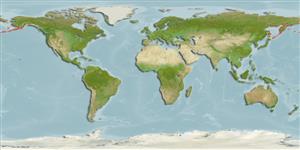Environment: milieu / climate zone / depth range / distribution range
Ecology
Marine; demersal; depth range 0 - 20 m (Ref. 58496). Temperate
North Pacific: Bering Sea to Kodiak Island, Alaska.
Size / Weight / Age
Maturity: Lm ? range ? - ? cm
Max length : 7.0 cm TL male/unsexed; (Ref. 2850)
Occurs in tide pools (Ref. 2850). Minimum depth reported at 0 m (Ref. 50610).
Life cycle and mating behavior
Maturities | Reproduction | Spawnings | Egg(s) | Fecundities | Larvae
Eschmeyer, W.N., E.S. Herald and H. Hammann, 1983. A field guide to Pacific coast fishes of North America. Boston (MA, USA): Houghton Mifflin Company. xii+336 p. (Ref. 2850)
IUCN Red List Status (Ref. 130435)
Threat to humans
Harmless
Human uses
Tools
Special reports
Download XML
Internet sources
Estimates based on models
Preferred temperature (Ref.
123201): 2.5 - 7.1, mean 4.6 °C (based on 491 cells).
Phylogenetic diversity index (Ref.
82804): PD
50 = 0.5020 [Uniqueness, from 0.5 = low to 2.0 = high].
Bayesian length-weight: a=0.01000 (0.00244 - 0.04107), b=3.04 (2.81 - 3.27), in cm total length, based on all LWR estimates for this body shape (Ref.
93245).
Trophic level (Ref.
69278): 3.2 ±0.5 se; based on size and trophs of closest relatives
Resilience (Ref.
120179): High, minimum population doubling time less than 15 months (Preliminary K or Fecundity.).
Fishing Vulnerability (Ref.
59153): Low vulnerability (10 of 100).
